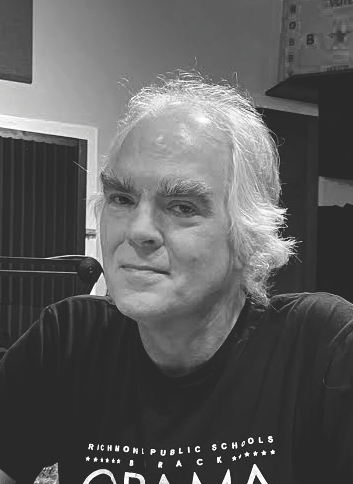With Antiphone, Spacebomb’s Trey Pollard steps into the limelight.

Photo by Sarah Walor
It’s difficult to market a classical chamber music record, no matter what the situation is,” Trey Pollard says. “I think there is always going to be a small audience for this kind of music.”
Pollard is best known as the inventive arranger behind the soul and indie-rock performers on Richmond’s Spacebomb label, founded in 2011. For his own first solo album, he’s taking a detour from his usual string and horn sweetenings. Antiphone is a beautifully realized classical chamber music disc, mostly four-string quintet, a moody mélange of cello and violin that simmers and stimulates. “I don’t see it as a record like any other Spacebomb has done,” the 35-year-old guitarist/arranger says. “It’s all about making a statement, and trying not to lose too much money.”
Pollard is originally from Chesapeake—Western Branch, to be exact—and attended The Governor’s School for the Arts. From a musical family, he came to Richmond to study jazz at Virginia Commonwealth University. He considers Doug Richards, who founded the school’s jazz studies program, his mentor. But there was also inspiration closer to home. “My dad’s a musician, a guitar player, and I grew up with him being in local bands. As a little kid, I took piano lessons, switched to guitar when I was 11 or 12,” he says. “It’s always been there, the desire to make music.”
His work with both Spacebomb artists and established acts like The Waterboys and Foxygen was a springboard for the new disc. “When you do arrangements for others, you tend to come up with different ideas and find little things, little 10-second ideas, segments for musical figures, that may not work for someone else,” says Pollard. “I built up a stack of these ideas, a huge stack of paper with little snippets.”
One day, he booked a session with the Richmond-area string players who help him augment Spacebomb’s pop recordings and recorded them playing through some of his ideas.“I listened back and parsed out which ones I thought had the most musical legs. Around that same time, I was thinking that maybe I should make a solo record,” he says. “So I took what was perhaps a dozen ideas, and about a year ago, I finished them.”
Pollard likes a lot of dissonance, says violinist Ellen Cockerham Riccio, a member of the so-called Spacebomb Strings. “Even in his pop arrangements, there are notes that often we classical musicians will say, ‘I think there’s a wrong note in my part. Are you sure you want this?’ and he’ll say, ‘Yes, that’s what I want,’” she says. “He used the same technique on this record, so it’s very much Trey’s voice.”
Antiphone is brilliant mood music, augmented by Pollard’s idiosyncratic changes and firm grasp of musical dynamics, as well as the sensitive renderings of players like Cockerham Riccio, fellow violinist Adrian Pintea, violist Molly Sharp, cellist Schuyler Slack, and bassist Ayça Kartari. It’s a chamber music record that never feels like a museum piece, possibly because Spacebomb co-founder Matthew E. White produced it and, Pollard says, brought a fresh ear to the sessions. “Matthew was basically like a sounding board. He doesn’t listen to classical music, and that’s what I wanted. He’s just reacting to it all as sounds,” says Pollard. “So it became the thing that it wants to be, not something that necessarily reflects the history of classical string quartets.”
Pollard recorded the disc at Montrose, a Richmond studio known mainly for producing rock ‘n’ roll records, working with an engineer, Adrian Olsen, versed in modern music. “I like the way Montrose sounds for strings—a good open sound,” Pollard says. “I wanted the music to breathe a little more.”
Spacebomb itself is in the process of adding some breathing room. The label/studio is moving into a new, larger space in the Fan area of Richmond. “We’ve been doing a lot of arranging and string sections and big groups of musicians recording, and we’re always finding ourselves recording in other studios that have the room, like with this record,” says Pollard. “It’s a big expense for us to have a studio but also have to go into another studio to record.”
As for selling a classical record on a label known for popular music, Pollard admits that there are challenges. “It’s an issue, sure, but at some point you just do it for the music. And the art of it,” he says. “And hopefully people will find it and enjoy it.” SpacebombRecords.com
This article originally appeared in our April 2019 issue.








